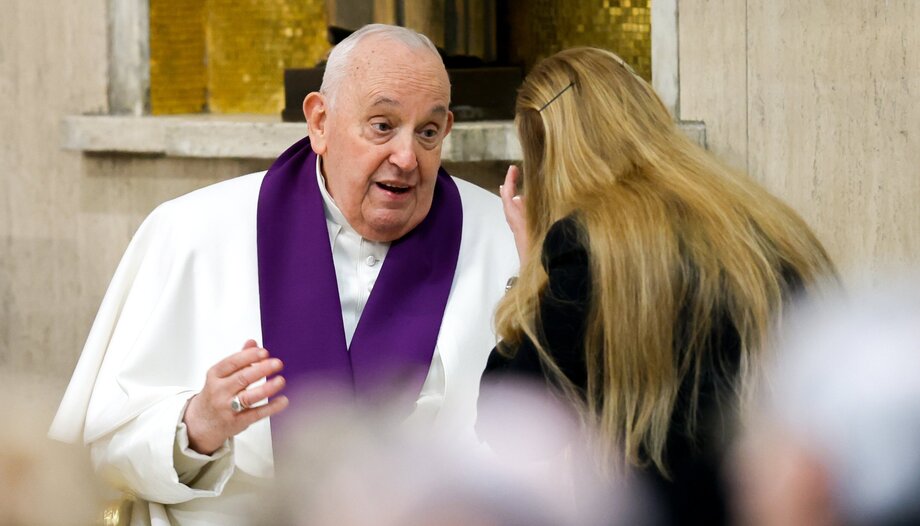As he has for the past ten years, Pope Francis once again presided over the "24 Hours for the Lord" initiative, coordinated by the Dicastery for Evangelization - Section for Fundamental Questions of Evangelization in the World, an entire day dedicated to living and "rediscovering" the Sacrament of Confession, which this year took place on March 8 and 9.
As he did last year, the Pontiff wanted to experience this annual Lenten celebration, now in its eleventh year, in a Roman parish, this time in the Aurelio district, not far from the Vatican, personally hearing confessions of the faithful. He was accompanied, as always, by Monsignor Rino Fisichella, proprefect of the Dicastery for Evangelization.
Surrender to Jesus
"Let us not renounce God's forgiveness, the sacrament of Reconciliation," the Pope suggested to the faithful present during his homily, explaining that going to confession "is not a devotional practice, but the foundation of Christian existence." Nor is it "to be able to say our sins well", but "to recognize ourselves as sinners" and abandon ourselves "in the arms of Jesus crucified to be freed". A way, in short, to obtain "the resurrection of the heart" that the Lord works in each one of us.
Walking in a new life
A desire for renewal that comes from Christ himself, who wants his children to be "free, light inside, happy and on the way" instead of "parked on the roads of life". The metaphor of the journey is also taken from the passage of St. Paul to the Romans chosen for this year's celebration: "To walk in newness of life" (Rom 6:4), and clearly refers to the moment of Baptism. In the life of faith, therefore, there is no "retirement"-an image that the Pontiff often uses when he wants to indicate the desire to move forward in life, avoiding boredom and idleness as an end in itself-but rather a continuous taking of steps forward that must nevertheless be oriented towards the good.
However, "how often do we get tired of walking and lose the sense of moving forward"? Here, then, the Lenten journey comes to the rescue, as an opportunity to "renew ourselves" and return "to the condition of baptismal rebirth" thanks to divine forgiveness: "The Lord removes the ashes from the embers of the soul, cleanses those inner stains that prevent us from trusting in God, embracing our brothers and sisters, loving ourselves" by forgiving everything.
God always forgives
In fact, Pope Francis once again reiterated that God always forgives and never tires of doing so; rather it is we who tire of asking his forgiveness. "Put this well in your mind: only God is able to know and heal the heart, only He can free it from evil." The important thing is to believe it, to desire to purify oneself and to have recourse to his forgiveness, in order to return "to walk again in a new life".
Apostolic Penitentiary
Continuing with the theme of Reconciliation, on the morning of March 8 Pope Francis received in audience the participants in the Course on the Internal Forum promoted by the Apostolic Penitentiary, to whom he addressed a dense discourse on the meaning and correct interpretation of the prayer recited during Confession, the Act of Contrition.
A prayer, written by St. Alphonsus Liguori, master of moral theology, which, despite its somewhat ancient language, retains, according to the Pope, "all its validity, both pastoral and theological".
Repentance, trust and purpose
In particular, the Pontiff, in his prepared speech and then delivered to those present, focused on three particular attitudes: repentance before God - that awareness of one's sins that leads to reflection on the evil committed and to conversion; trust - as recognition of the infinite goodness of God and of the need to put love for Him first in life; intention - the will not to relapse into the sin committed; and intention - the will not to fall back into the sin committed.
To confessors - Pope Francis concluded - is entrusted a "beautiful and crucial task" that can allow the many faithful who approach the sacrament of Confession "to experience the sweetness of God's love". A fundamental service that must be prepared with even greater care in view of the upcoming Jubilee of Hope.








